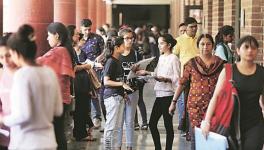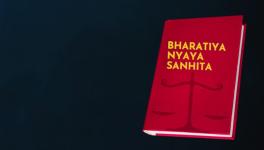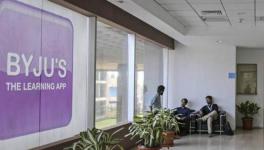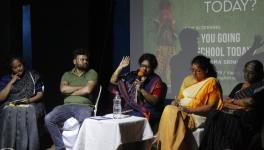UGC’s Note on ‘Blended’ Learning Draws Flak from University Teachers
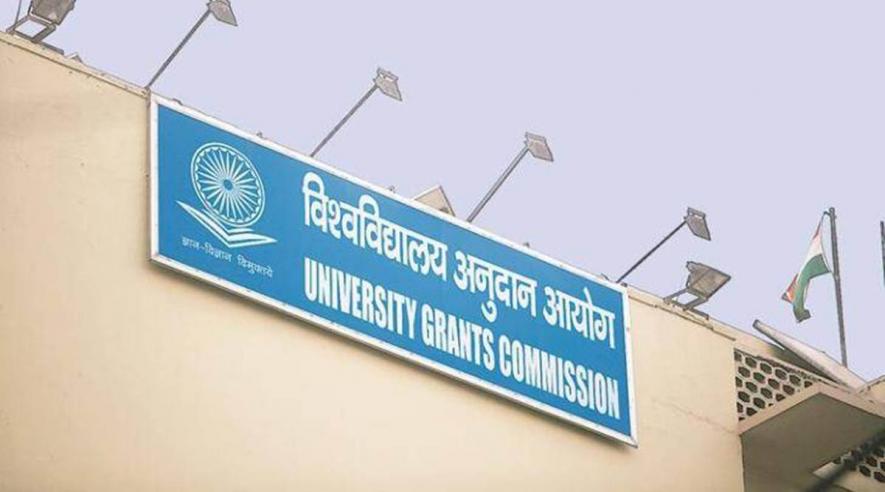
Image Courtesy: The Indian Express
The University Grants Commission’s concept note for implementation of a blended mode – a mix of online and offline – of learning in universities has invited flak from teachers’ bodies across the country.
University teachers fear that the implementation of the suggested learning model, accompanied with other policy decisions of the Narendra Modi government in the field of education, will “redefine” the paradigm of higher education, forcing it to “be at the mercy of market forces”.
Hidden behind their fear is the grimmer reality that the concept note portends: of the ultimate dismantling of public funded education that will further disadvantage the marginalised sections of the society.
The UGC, in a concept note released on May 20, encouraged “blended” mode of teaching by proposing to allow universities to offer up to 80% of any non-technical academic programme online. The commission had asked the stakeholders to submit their feedback on the concept note prepared by an expert committee on or before June 6.
The university watchdog had said that the higher education institutes (HEIs) will be allowed to teach up to 40% of each course online, while the remaining can be taught offline.
Under the current system, the universities and colleges are allowed to offer up to 40% of the syllabus of a programme in a semester online through the e-learning platform Study Webs of Active-Learning for Young Aspiring Minds (SWAYAM). This was allowed last year, up from the 20% allowed in 2017.
Also read: Students', Teachers' Unions Slam UGC Note on 40% Online Learning
Now under the new proposal, an additional 40% of online education, other than SWAYAM courses, is suggested, making it possible for varsities to conduct real-time virtual classes and exams through online means – both were not allowed earlier.
In a press statement dated June 6, the All India Federation of University and College Teachers’ Organisation (AIFUCTO) urged the commission to withdraw the concept note, alleging that the move “threatens the autonomy of the universities and the higher educational institutes”.
“If the concept note is implemented [then] the entire education system will be at the mercy of market forces making the role of teachers redundant,” the statement said. It will “ultimately dismantle” the public funded universities and will “cause disadvantage” to the marginalised sections of the society, the teachers’ body added.
Similarly, Delhi University Teachers’ Association (DUTA), in a feedback on the proposed blended mode, said that the implementation of the latter, along with SWAYAM Regulations 2021 and Academic Bank of Credits (ABC) model, will “redefine the entire paradigm of Higher Education,” and will “reduce the role of teachers”.
“These policy documents do not take any responsibility of the quality of the degree in terms of their meaningful composition and employability,” DUTA said in its feedback, adding that the case presented by UGC in favour of blended mode of learning, “also ignores the practical realities and experiences that thousands of students and teachers have shared on public platforms over the last year”.
Teachers’ organisations in Kerala, too, have earlier opposed the said commission’s terming the initiative as “anti-people”. “We fear that blended learning would further widen the digital divide among the learners. It would eventually disrupt the advantages earned through the face-to-face mode of teaching on the campuses,” N. Manoj, president of the Association of Kerala Government College Teachers, was quoted by The Hindu as saying.
Meanwhile, two teachers' associations of Jadavpur University have told the commission that the necessary physical infrastructure for the application of digital tools must be developed by the government.
“The geographical location of 60% of all colleges and 40% of all universities in India is in rural areas where network connectivity is a major issue. Moreover, the digital divide among students is starkly visible across gender, caste, religion, region, and income…,” Jadavpur University Teachers’ Association (JUTA) said in their response.
Also read: India’s Digital Divide: Who Faces it and How Wide is it?
The All Bengal University Teachers’ Association (ABUTA) also registered its discontent. “We had lodged our protests against the draft of new National Education Policy [as well] but the UGC ignored. We feel this blended teaching will destroy public funded university system, and help the privately run corporate sector,” ABUTA – JU unit convenor Goutam Maity was quoted as saying by The Times of India.
Moreover, not just teachers’ associations, but critical views on the commission’s move were also shared by the Kerala Higher Education Minister R. Bindu earlier last month.
According to The Hindu, the minister said, “As a teacher myself, I used to interact with students on a wide range of subjects that often went beyond the confines of curriculum. But such discussions may not find places in online classes when teachers would mostly stick to the syllabus. There is also the issue of gauging response of students, despite being able to record attendance.”
Get the latest reports & analysis with people's perspective on Protests, movements & deep analytical videos, discussions of the current affairs in your Telegram app. Subscribe to NewsClick's Telegram channel & get Real-Time updates on stories, as they get published on our website.











